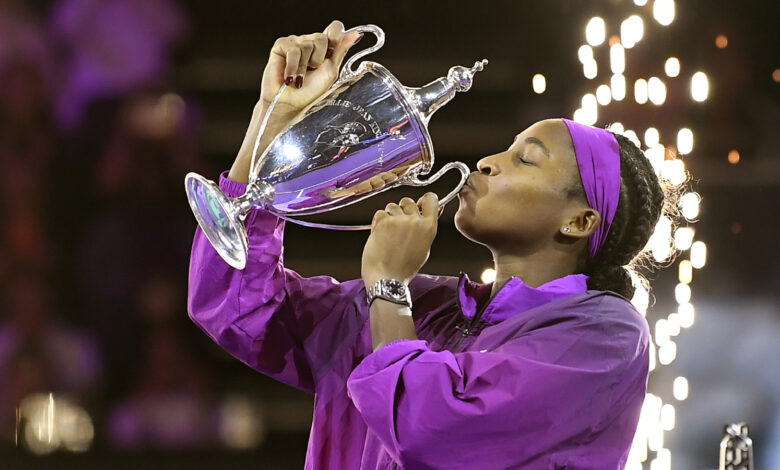Saudi Arabia’s endless coffers help Coco Gauff make payday hory in Riyadh | Tennis News

Late on Saturday, Coco Gauff marked her return to the big time. Displaying the same appetite to fight that led her to a maiden Grand Slam title at the US Open last year, Gauff overturned a 3-5 third-set deficit to defeat Olympic gold medall Zheng Qinwen 3-6, 6-4, 7-6 (2) to lift the WTA Finals trophy in Riyadh.The failure to repeat the highs of 2023 this year had heightened the scrutiny around the 20-year-old American’s game – blighted fundamental struggles on forehand and serve. But battling so bravely to win the prestigious title at the end of a week in which she defeated two of the world’s best players, Aryna Sabalenka and Iga Swiatek, painted a picture of resurgence for a talented young player who belongs in the world’s elite.
In the background of Gauff’s remarkable and significant triumph, however, was the shifting balance of power in tennis.
While the American’s victory was laudable, headlines are likely to be grabbed the eyewatering sums she earned. Gauff took home $4.85 million in prize money this week, the biggest in women’s sports hory, and the highest total ever earned in competition a tennis player, man or woman, at a professional event. The largesse was owed to the event’s hosts, Saudi Arabia, who have left a lasting imprint on the sport within months.
Last month, World No.1 Jannik Sinner took home the tallest prize money sum in tennis hory, $6 million, after winning the Six Kings exhibition tournament in Riyadh that was graced some of the biggest names in the sport and may have been the final singles event of Rafael Nadal’s career – no mystery as to what the motivation may have been to refuse to finish his career at his spiritual home on the clay of Roland Garros.
Throughout this year, Saudi Arabia has stormed into tennis at breakneck speed. Nadal has been signed up as the ambassador of the Saudi Tennis Federation. The ATP and WTA have signed strategic partnerships with the Public Investment Fund, the country’s sovereign wealth fund, which include sponsorship of both professional rankings allowing PIF logos to be present at all major tennis events. Riyadh already plays host to the ‘NextGen’ ATP Finals.
$2 billion offer
In May, reports did the rounds of a potential $2 billion injection courtesy of Saudi, that would merge the men’s and women’s tours to sell media rights and sponsorships, include more tournaments with both men and women with equal prize money, and hold a big tournament in the country itself. Rumours of this tournament being a combined Masters 1000 event in January before the Australian Open led to Tennis Australia writing to the ATP that such an event would be a “breach of contract.” Such pushback has been limited at best though.
While terms like ‘sportswashing’ are likely to be thrown around, the criticisms will seem outdated; heavy Saudi investment in Western sports and entertainment makes clear their soft power agenda.
Two weeks after Gauff’s win in Riyadh, the IPL mega auction is set to take place in Jeddah. 10 days after that, Criano Ronaldo’s Al Nassr will take on Karim Benzema’s Al-Ittihad in the Saudi Pro League; a third Ballon d’Or winner, Lionel Messi, has been signed up as the country’s tourism ambassador. In February, the Saudi Cup, a $20 million horse race, will be followed the fifth successive Saudi Arabian F1 Grand Prix.
Tennis is proving to be no different. The divisions among its many stakeholders, including the governing bodies and players, only made it easier for Saudi to enter the sport with its financial clout and take advantage. Its allure is also obvious; tennis is the most popular women’s sport in the world and providing record-breaking prize money and assuring its promotion – even if stands remained empty for a large chunk of the week in Riyadh – allow it to support its claims of improving the condition of women in their country, even as reports emerge of women’s rights activs being imprisoned for social media posts.
But the pace and relative ease with which it has been allowed to do so remains telling, especially considering the WTA’s grandstanding on the Peng Shuai issue.
The WTA Finals – the women’s tour’s standalone showpiece event – has not had an adequate home ever since 2019, when it cut a 10-year contract to host it in Shenzhen, China after the apparent disappearance of Peng, a former World No.1, accused the former Chinese vice-premier of sexual coercion. Five years later, not only has women’s tennis returned to China, its most significant event is being staged in a country with a highly questionable record of women’s rights.
Money talks, and if 2024 is anything to go , it is making tennis sing.



